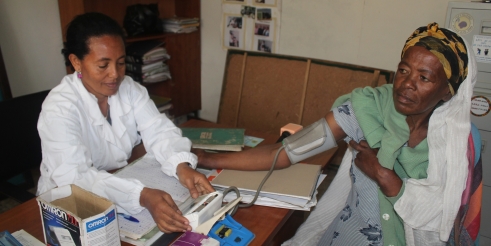
The number of people living with non-communicable diseases (NCDs) in Kenya is increasing. Urbanisation, an ageing population, and the adoption of unhealthy lifestyles that include poor diets, lack of exercise and excessive alcohol consumption are leading to a growing prevalence of conditions including diabetes, cancer and cardiovascular disease.
Earlier this month, the Ministry of Health in Kenya launched the first nationally representative survey presenting comprehensive information on NCDs and their risk factors. It aims to establish a surveillance platform for NCDs to better understand risk factors and causes to help improve the country’s policy and planning. While the survey marks a positive step forward in our knowledge on NCDs, it falls short by collecting information only on adults aged 18-69. For Kenya’s policy and planning on NCDs to be truly evidence based, further data collection is needed among people aged 70 and over.
The threat of NCDs in Kenya
The results of the survey are nonetheless alarming – NCDs are on the rise, and the unhealthy lifestyles of Kenyans are to blame. This poses a huge challenge to the country’s already overstretched health facilities.
NCDs account for 27% of the total deaths and over 50% of the total hospital admissions in Kenya, according to the STEPs 2015 survey.
For older men and women, the situation is even worse. The Kenya STEPs survey indicates that at least 25.9% of Kenyans aged 45 to 69 have a lifestyle in which there are one or more risk factors for NCDs. These include smoking, eating less than five servings of fruits and vegetables a day, insufficient physical exercise, being overweight or having high blood pressure.
For millions of older men and women in Kenya and across Africa who struggle to access quality healthcare and services, the prevalence of these risk factors is a huge concern. They continue to queue for hours to be seen at clinics, and spend great proportions of their meagre incomes to purchase medication.
Francis, a 70-year old resident of Nairobi who has been living with diabetes for 30 years, says he spends most of income managing his condition. He does not have a pension because he was not employed in the formal sector and often has to make the tough decision between eating or buying medication.
Stories just like Francis’ are not hard to find across Africa. Yet at 70 years of age, Francis would not have been included in Kenya’s STEPS survey and data on his experience with diabetes would not have been captured. Although the Kenya STEPS survey has given us some limited yet important new data on the prevalence of NCDs, health practitioners have been well aware of the rise of NCDs and the impact on lives of millions of men and women of all ages. So what we have been doing wrong all this time?
Understanding in the community
Lack of public awareness on risks factors is a major concern, according to Dr Joseph Kibachio, the Head of the NCD Control Unit in Kenya’s Ministry of Health. He says there is a need for all actors in Kenya and across the continent to work together in raising awareness, getting NCD prevalence under control and treating those with the conditions. This is not the work of the Ministry of Health alone.
For this to happen, national and local governments must prioritise comprehensive and targeted prevention, control and management at all levels. This will require increased resource allocation. For instance, campaigns targeting older people must be customised and disseminated using appropriate channels or else they will fall on deaf ears. Meanwhile, surveys such as STEPS must be inclusive of everyone, with data disaggregation not reaching a ceiling at age 69.
As the African Union (AU) embarks on reviewing the Africa Health Strategy (2016-2030), we are urging member states and the AU commission to honour the rights of older people and strengthen age-friendly prevention, diagnosis and treatment of NCDs. Without this emphasis, many more older people across Africa will develop life-threatening conditions and miss out on a dignified and healthy later life.
